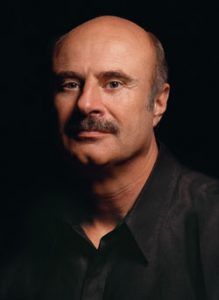
“Phil McGraw” by Jerry Avenaim. Licensed under CC BY-SA 2.5.
It’s not everyday that a copyright case involves claims of false imprisonment but an order granting summary judgment entered on August 30th in the Eastern District of Texas granted a legal win to American TV personality and psychologist Dr. Phil and his production studio in just such a case. Judge Rodney Gilstrap decided to grant summary judgment sua sponte to Dr. Phil and Peteski Productions in a case against a former segment director for The Dr. Phil Show after the director recorded an iPhone video from archived footage of The Dr. Phil Show to build evidence for a emotional distress suit against Dr. Phil.
As the motion granting summary judgment notes, the copyright action stems from activities undertaken by a segment director who had worked on The Dr. Phil Show from 2003 until early 2015 before filing an April 2015 lawsuit in California state court. That suit alleged charges of false imprisonment, intentional infliction of emotional distress, retaliation and wrongful termination. To provide a bona fide example of Dr. Phil’s conduct, the director used an iPhone to record a nine-second clip from a larger archive of unaired footage from The Dr. Phil Show.
On June 15th, Peteski Productions filed its complaint against the former segment director alleging that it owns the copyright on the recorded video clip featuring archived footage of Dr. Phil aboard a private plane. Peteski alleged that the segment director’s access of the video file in an attempt to “smear” Dr. Phil and “extort money” in violation of Peteski’s exclusive right to reproduce or prepare derivative works from the archived video material from the television show.
In response to Peteski Productions’ copyright infringement claim, the former segment director raised a fair use defense. A motion to dismiss filed by the defendant in July argued that this case constituted a fair use of copyrighted material because the material was used in connection with litigation while it wasn’t used for any commercial gain. The defendant also noted the factual nature of the recording and the fact that the clip was much shorter than the whole recording as factors supporting a fair use defense.
In Judge Gilstrap’s motion granting summary judgment, the court concluded that bad faith was not a per se bar to a fair use defense, which Peteski Productions had argued. Peteski had alleged that the defendant was trying to sell the clip to the National Enquirer but the court found no evidence of any potential sale in the voicemails left by the defendant with that tabloid publication. However, the court did find that the defendant did record the material for personal gain without any countervailing public interest and that the material was recorded in breach of the former segment director’s employment agreement with Peteski, especially the confidentiality provisions of that agreement.

![[IPWatchdog Logo]](https://ipwatchdog.com/wp-content/themes/IPWatchdog%20-%202023/assets/images/temp/logo-small@2x.png)

![[Advertisement]](https://ipwatchdog.com/wp-content/uploads/2024/04/Patent-Litigation-Masters-2024-sidebar-early-bird-ends-Apr-21-last-chance-700x500-1.jpg)

![[Advertisement]](https://ipwatchdog.com/wp-content/uploads/2021/12/WEBINAR-336-x-280-px.png)
![[Advertisement]](https://ipwatchdog.com/wp-content/uploads/2021/12/2021-Patent-Practice-on-Demand-recorded-Feb-2021-336-x-280.jpg)
![[Advertisement]](https://ipwatchdog.com/wp-content/uploads/2021/12/Ad-4-The-Invent-Patent-System™.png)







Join the Discussion
No comments yet.